[Abhorsen 03a] - Across the Wall Read online
Page 11
Abbas shook his head and screwed the lid tight.
“No more for now,” he said quietly. “Later.”
Joshua’s lower lip trembled but he didn’t protest. He just held Charlie Rabbit tighter, his small face crumpled in shock and puzzlement.
Abbas wiped the dust off the lantern. The light brightened, but that didn’t help. It lit up a tiny pocket of clear space, just big enough for the two of them to crouch in.
They were completely buried under the ruins of the house.
From the continuing tremble he could feel through the floor, Abbas knew that there were still missiles falling, though they were striking farther away. That meant there would be little or no chance of rescue. There were already thousands of destroyed houses. No one would search under this one. No one knew they would be here.
Joshua mumbled something, the words lost in Charlie Rabbit’s ears.
“It’s okay,” said Abbas. He wished he sounded more convincing. He cleared his throat and tried again. “We’re safe here, now.”
“Where’s Mum?” asked Joshua, more audibly. “I want Mum.”
Abbas closed his eyes for a second. I have to be brave. I have to be brave. “She’s okay too. She’ll…she’ll come and get us in the morning.”
“When is it morning?”
“Not for a long time. Try to go back to sleep.”
Joshua stared at his brother.
“Can’t sleep.”
“I’ll tell you a story.”
“A Charlie Rabbit story?”
“Uh, I suppose. Let me try and remember the story for a second.”
Joshua nodded his agreement. He loved stones.
Abbas didn’t try to think of a story. He tried to think about what they could do. He had to remember everything his father had told him about the shelter, about what to do. But it was over a year ago, and he hadn’t paid attention—
“Who else is in the story?”
“What?”
“Who else is in the story, besides Charlie?”
Abbas shook his head. He couldn’t think, but Joshua needed a story. He had to be distracted from their situation.
“There were two boys,” he said. “Their names were—”
“Abbas and Joshua!”
“Okay, Abbas and Joshua. They lived long ago in a city of white flowers, in a beautiful and peaceful kingdom. Everyone was happy, and there was plenty to eat and good things to drink, like hot chocolate. Abbas and Joshua went to a school that had lots of books and teachers for every subject. But one day a terrible giant appeared and demanded that everyone in the city hand over half their gold or—”
“He would eat them?”
“No…he would destroy their city. The giant was so big and so horrible that the people had no choice. Abbas and Joshua had no gold, but their parents had to give up half their life’s savings to the giant. The giant took the gold and went away, and everyone was happy again.”
“Didn’t they ask Charlie Rabbit for help?”
“No, not yet. They thought if they gave the gold, the giant would go away. But the next year the giant came back again, and this time he had brought his friends. Three huge giants who stamped and shouted and demanded all the gold that was left or they would smash the people into little pieces.”
“Why didn’t they fight? I bet Abbas and Joshua would fight.”
“They couldn’t fight. The giants were too big, and they could throw huge rocks from far away. So the people of the city handed over their gold and hoped that they would never see the giants again.”
“But the giants came back?”
“Yes, the giants came back. This time they didn’t ask for gold. They said they were going to smash the city into little bits and there was nothing anyone could do about it—”
“Except Charlie Rabbit!”
“Yes, but no one knew where Charlie Rabbit was. He’d gone away and he hadn’t come back.”
“But he did!”
“Well, first of all Abbas and Joshua decided to go looking for him. But before they could leave, the giants started to throw rocks at the city. Huge rocks, bigger than houses, that fell down from the sky, smashing everything to bits.
“Abbas and Joshua were in their house when the first rock struck. They knew they couldn’t go out, so they climbed down a ladder into a cave. There was a secret tunnel from the cave that came out beyond the city walls. But while they were still in the cave, a really big rock hit directly above them!”
Joshua took a sharp intake of breath. His eyes were huge, staring at Abbas, waiting for what happened next.
“The cave collapsed all around the two boys. They were trapped.”
“What happened then?”
“Then…” Abbas began, but he couldn’t go on. His mouth trembled and he felt tears start in his eyes. “Then…”
“Then Charlie Rabbit came back,” said Joshua, eagerly taking over the story. “Charlie Rabbit smelled the boys in the tunnel, and he dugged them up. Then Charlie Rabbit jumped over to the giants and he kicked them with his big foots. Wham! Wham! Wham! Wham! Wham! The giants ran away and everyone was happy and Charlie Rabbit ate a carrot.”
Abbas nodded.
“Yes…that was what happened.”
“I’m going to sleep now,” announced Joshua. He dragged one of the old blankets out of the box and curled up on it. “Wake me up when Charlie Rabbit comes to dig us out.”
“I will,” said Abbas. He felt truly helpless. If only there were a secret tunnel, or a real Charlie Rabbit…
Secret tunnel. Another way out.
Abbas remembered what his father had said. There was another way out. The shelter backed onto the old ice chute, which had been used long ago to slide the ice blocks from the street down to the cellar.
Abbas took a deep breath, then coughed it away. There was too much dust for deep breaths. Or maybe the air was running out. He took a shallower breath and edged around Joshua to the back of the shelter. The wall there looked just like the hard clay of the other walls.
Abbas tapped it and was rewarded with a hollow sound. He let out a sobbing half laugh and started to scrape. There was a wooden hatch behind the clay, one so rotten that it crumbled at his touch. Abbas attacked it eagerly, pulling at the wood in a frenzy, ignoring the splinters.
There was a narrow chute beyond the hatch. Abbas crawled a little way up it, then looked back at Joshua, marveling at his little brother’s ability to sleep. Should he wake him? Or should he make sure the chute was clear all the way to the street?
Abbas hesitated, then edged back down. As he backed into the shelter again, he heard Joshua sit up. And there was another noise, something rustling in the debris. A sound he couldn’t quite place.
“Abbas! It’s wet!”
It took Abbas a second to turn around in the confined space. By the time he could see, he could already feel the water around his ankles. It was freezing cold, and rising very quickly.
Broken water pipe. Maybe a big one. A water main. We have to get out!
“ It’s okay, Josh,” Abbas said quickly. He picked up the lantern and showed Joshua the entrance. “I’ve found the tunnel. The secret tunnel. You go up first. Quickly.”
Joshua scrambled up into the ice chute. Still sleepy, he didn’t pick up Charlie Rabbit. Abbas started after him but at the last moment grabbed the rabbit. Joshua would want it for sure, later.
Water burbled around Abbas’s knees as he climbed up into the chute. It was rising very quickly, far too quickly. Abbas pushed at Joshua’s legs to make him go faster.
“Hurry up!”
They crawled up at least thirty feet, with the water always lapping at Abbas’s feet, sometimes even catching up to his knees. Joshua’s speed varied, and Abbas had to keep pushing at him.
Then Joshua stopped altogether and let out a howl of protest as Abbas shoved at his legs.
“What’s wrong? Keep going!”
“Can’t,” said Joshua.
Abbas shone the l
ight up. He could see the top hatch. But it was broken and hanging down, and where the open air should be, there was a huge slab of concrete, its reinforcing wires hanging down like severed tree roots.
It was the roof of the bus shelter from across the street. It must have been blown off and come straight down on the ice chute exit. Now there really was no way out.
Abbas twisted around. The water was slowly swirling around his thighs. Cold, dark water, constantly rising.
“Lie on your side,” instructed Abbas. Joshua rolled over, and Abbas crawled up next to him. They could both just fit that way, though it was a squeeze. Charlie Rabbit was once again between them, and Joshua gratefully grabbed his ears.
Abbas worked the lantern around and shone it on the concrete slab that blocked their way. There was a small gap in one corner, not much larger than a softball. Abbas reached out and tried to crumble the concrete edges, but that only made his fingers bleed.
“Can…can you fit through there?” Abbas asked his brother hopefully. The water was up to his knees again, despite the extra yards he’d gained by moving next to Joshua.
Joshua shook his head. The gap was far too small.
Abbas put his hand against the wall. He couldn’t feel any explosions. The missile strike must be over. The civil defense teams would be out. But how could he attract their attention quickly enough? They’d be drowned in ten or twenty minutes.
“Help!” he shouted, the word leaping out of his mouth almost without him thinking about it. Joshua flinched at the noise. “Help!”
The sound echoed back from the concrete and the rising water, but Abbas knew it had not penetrated aboveground. No one could hear him.
“I’m cold,” whimpered Joshua. “It’s wet.”
“I’m trying to get help,” said Abbas. “I’m trying—
“Charlie Rabbit—”
“Shut up about Charlie Rabbit!” screamed Abbas. He grabbed the rabbit and pulled its ears apart, trying to rip it in his desperate anger. “Charlie Rabbit is a toy!”
Joshua started to sob again—deep, wracking sobs that shook his whole body.
Abbas stopped pulling Charlie Rabbit’s ears and stared at its big-eyed, long-nosed, furry face. Charlie Rabbit was a toy. A very fancy toy.
“Ssshhh, it’s okay,” Abbas said more gently. “I’m sorry. Charlie Rabbit is going to help us.”
Joshua’s sobs became a sniffle.
“He is?”
“He is,” confirmed Abbas. He tore off a long piece of wood from the broken hatch and propped it against the gap in the concrete block. Then he opened the panel on the back of Charlie Rabbit. “Only we have to sit in the dark for a while, because Charlie needs the batteries from the lantern. Can you be brave for Charlie Rabbit?”
“Yes…”
Abbas set Charlie down between them, turned off the lantern, and took out the carefully hoarded batteries one at a time.
One slip now, one battery dropped down the chute…I must concentrate…this has to work….
He got the batteries in, slid the switch to “maximum,” and closed the panel. Would Charlie still work? Even if he did, would it help? The water was up to his waist now, and it was so cold, he couldn’t feel his legs anymore.
“Joshua,” he whispered. “Feel for Charlie. Twist his nose.”
He heard Joshua move. Then there was a sudden light and a burst of sound. Charlie Rabbit twitched, and his eyes shone with a deep, bright-green glow; his paws went up and down, and his internal speaker began to hum.
Abbas pushed Charlie Rabbit into the gap above, then used the broken timber to shove the toy through, into the open air. As it emerged, the rabbit started to sing its trademark song:
“Hoppity, hoppity, hoppity me,
I’m as happy as I can be
Carrot, lettuce, radishes, too,
I’m Charlie Rabbit, how do you do?
Hoppity, hoppity, hoppity through,
Let’s all be happy, too—”
The song suddenly stopped.
Abbas waited, holding his breath, hoping that he would hear the stupid song start again, or someone call out to them, or something. But there was nothing. The chill water was up under his arms, rising even more swiftly now.
“Joshua,” said Abbas quietly, “crawl up as far as you can and put your face against that hole. Pull your legs up, out of the water.”
“Charlie Rabbit will get help,” said Joshua confidently as he curled into a small ball.
“Yes,” said Abbas in the darkness. He closed his eyes and let his head rest on the ground, close to the water that was caressing his neck. He was so cold now, he couldn’t really care what happened. “Charlie Rabbit will get help.”
“Hoppity, hoppity, hoppity through, Let’s all be happy, too,” sang Joshua. “Hoppity, hoppity…Abbas!”
“What?”
“Look, Abbas! Light!”
Abbas opened his eyes. The concrete block was rising up, rising into the air. Harsh, white electric light spilled down the chute, so bright he had to shield his eyes. Hands came reaching down to take Joshua, and then Abbas was lifted out himself, water spilling out onto the street behind him. Loud voices were all around him, shouting, asking questions, too much noise for Abbas to make any sense of it, save for one small voice that cut through everything. Joshua’s voice, shrill in the night.
“Charlie! I want my Charlie Rabbit!”
INTRODUCTION TO FROM THE LIGHTHOUSE
Both my memory and my records are rather blank on this story. I thought I wrote it specifically for the 1998 anthology Fantastic Worlds (edited by Paul Collins), but when I checked the copyright date for “From the Lighthouse,” I found it was 1996, and all the other stories were 1998. Which suggests the story appeared somewhere else first, and I do have a faint niggling memory that it did see print somewhere obscure before being collected in Fantastic Worlds.
This completely destroys my explanation of the origins of the story. When I thought it first appeared in Fantastic Worlds, I was going to say that I must have started with landscape because of the anthology title, with the idea of an island in the ice, protected by a Summer Field. I’m pretty certain that the setting came first, and some of the details of the place and its people, but it can’t have been sparked by the anthology title.
This is one of my notionally science fiction stories, in that it features technology and some vague explanation of that technology, but it still has the feel of fantasy. Perhaps it is science fantasy, a handy label for one of the many borderlands of the overlapping genres. I’ve never written any “hard” science fiction, in which the science can bear rigorous examination or is a real extrapolation of current knowledge. I’d like to think that this is not just laziness and a lack of intellectual stamina, but rather a love of story, which always is paramount to me. Having to make the science work as well as everything else just seems too hard. I like to read it, though, which suggests that I am actually just lazy.
I suspect that I originally intended to revisit this setting in another story, and I do have a faint recollection of jotting down some notes about the island and its people. But those notes are lost, seemingly like everything else related to “From the Lighthouse,” apart from a few letters having to do with Fantastic Worlds. But as I haven’t revisited the oasis island of Lisden for about a decade, I guess it can wait until I find a story welling up out of my subconscious that wants or needs to be set there, at which time I can reinvent everything I made up before.
FROM THE LIGHTHOUSE
1. ARRIVAL
everyone gathered at the wharf when the gold-hulled ice cruiser docked. Not because they’d been told to, though some people thought there had been some sort of instruction, or invitation. It was simply curiosity.
The Kranu hunters had met the yacht some five relgues offshore and, finding the Kranu refusing to rise through the hot holes and the day dull, had formed up around it as an escort. The villagers, seeing the hunters skating in two lines on either side of a great v
essel with sun-colored sails, had naturally come to see the hunters’ prize.
Marcus Kilman saw it quite differently. From the poop of the Mercurial Gadfly he waved left-handed, in the manner of a ruler to newfound vassals. His right hand crept finger by finger between the buttons of his crisp white suit. In his gold-heeled boots he was five foot one, and thanks to a nightly exercise with lead sinkers his earlobes were almost pendulous enough to be handsome.
When the Mercurial Gadfly finished tying up at the wharf that poked out of the island’s Summer Field into the ice, the crew paraded on the foredeck, the ex-Senatorial Navy bosun plying his whistle in what Kilman believed to be a salute, but was actually the opening bars of the theme from the comic opera The Great Kranu from the Deep. As always, the crew smirked solemnly, laughter submerged in hacking coughs. Kilman frequently had his Bonesman check them for lung rot or throat curse. He was afraid of any kind of infection, physical or intellectual. The Bonesman never found either sort aboard Kilman’s ship.
Kilman descended from the poop, reappearing at the gang-way. The waiting crowd of islanders, silent out of politeness rather than awe, pleased him immensely. Respect! At last he had found somewhere untainted by egalitarian ideals. He would be king, and they would be his peasantry.
“People of Lisden!” he declaimed, his voice breaking pitch like a badly blown trumpet. “I am Marcus Kilman, and I have purchased this island. I am your new owner.”
The islanders greeted this disclosure with equanimity. Kilman had allocated ten seconds for rapturous applause but resumed speaking after only six seconds of embarrassing silence.
“People of Lisden! I will bring you a new era of peace and prosperity, lower taxes, and good government.”
This provoked a reaction of sorts. A murmur ran through the audience like a water spider skidding from lily to lily or, in this case, from each mainland speaker in the crowd. Lisden already had peace; as much prosperity as they could handle without having greed; taxes were nonexistent, as the Kranu cooperative provided all services from its profits (if any); and the only government was the board of the cooperative, which included every adult islander. Theoretically, there was a main-land government department that looked after their affairs, and the Humble and Obedient Senate of the People beyond that, but both had lost the Lisden file years ago, and consequently denied the island’s existence.

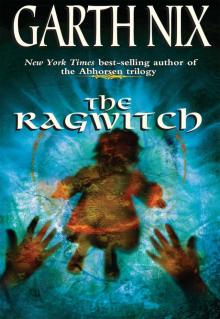 The Ragwitch
The Ragwitch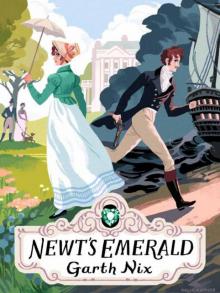 Newt's Emerald
Newt's Emerald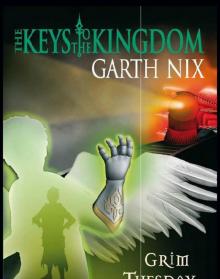 Grim Tuesday
Grim Tuesday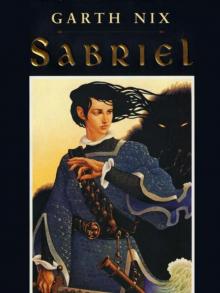 Sabriel
Sabriel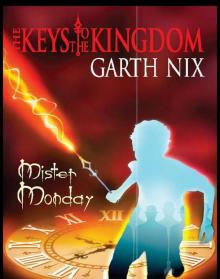 Mister Monday
Mister Monday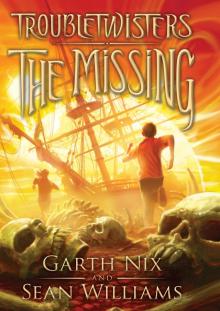 The Missing
The Missing The Fall
The Fall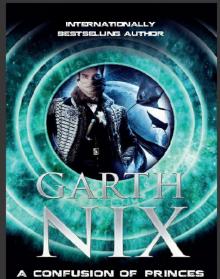 A Confusion of Princes
A Confusion of Princes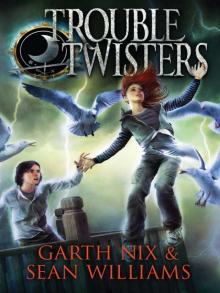 Troubletwisters
Troubletwisters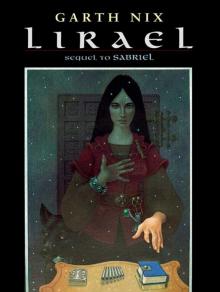 Lirael
Lirael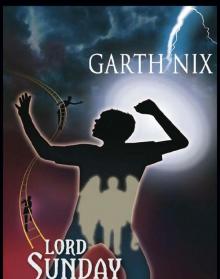 Lord Sunday
Lord Sunday Clariel
Clariel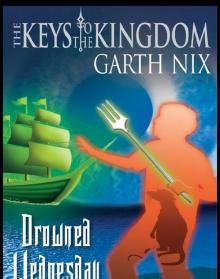 Drowned Wednesday
Drowned Wednesday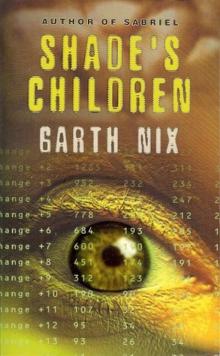 Shade's Children
Shade's Children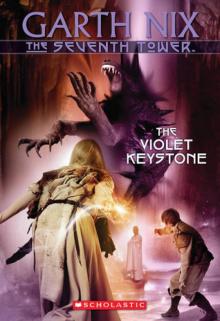 The Violet Keystone
The Violet Keystone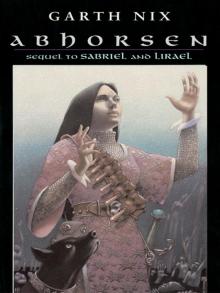 Abhorsen
Abhorsen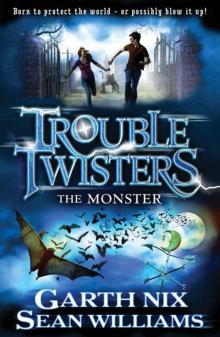 The Monster
The Monster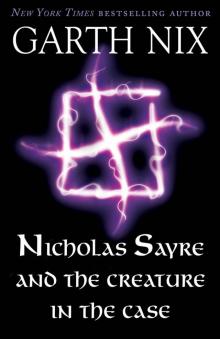 The Creature in the Case
The Creature in the Case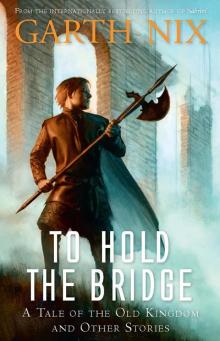 To Hold the Bridge
To Hold the Bridge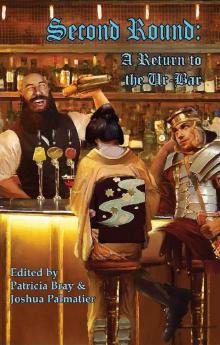 Second Round: A Return to the Ur-Bar
Second Round: A Return to the Ur-Bar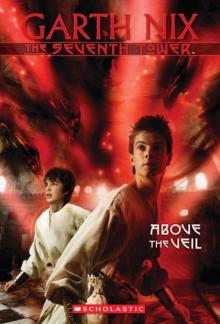 Above the Veil
Above the Veil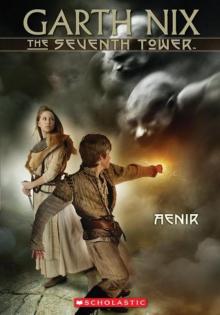 Aenir
Aenir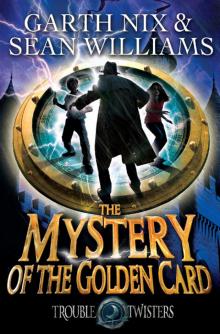 Mystery of the Golden Card
Mystery of the Golden Card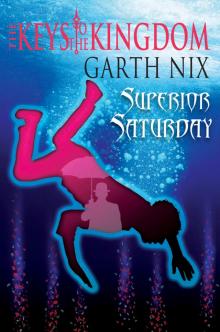 Superior Saturday
Superior Saturday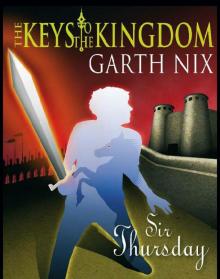 Sir Thursday
Sir Thursday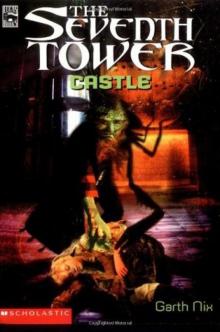 Castle
Castle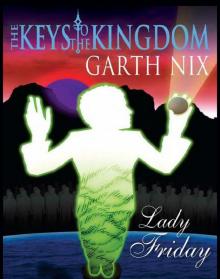 Lady Friday
Lady Friday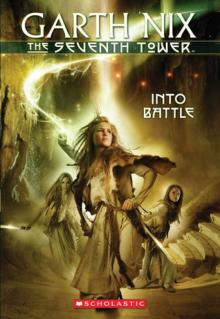 Into Battle
Into Battle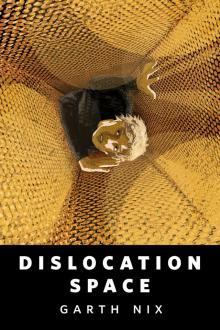 Dislocation Space
Dislocation Space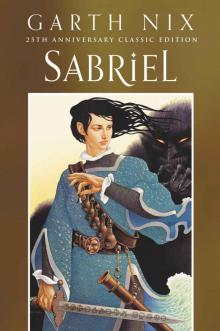 Sabriel (Old Kingdom Book 1)
Sabriel (Old Kingdom Book 1)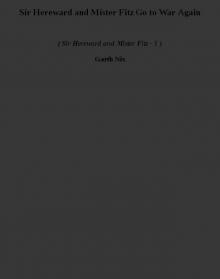 Sir Hereward and Mister Fitz Go to War Again shamf-1
Sir Hereward and Mister Fitz Go to War Again shamf-1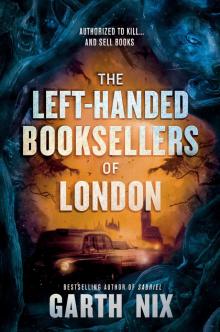 The Left-Handed Booksellers of London
The Left-Handed Booksellers of London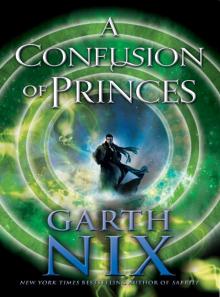 Novel - A Confusion of Princes
Novel - A Confusion of Princes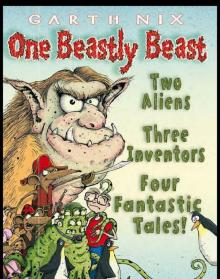 One Beastly Beast
One Beastly Beast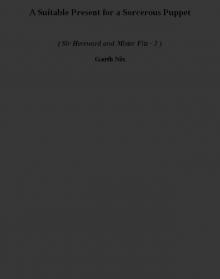 A Suitable Present for a Sorcerous Puppet shamf-3
A Suitable Present for a Sorcerous Puppet shamf-3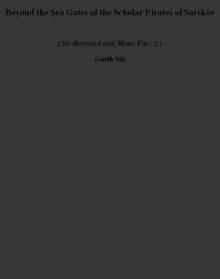 Beyond the Sea Gates of the Scholar Pirates of Sarsköe shamf-2
Beyond the Sea Gates of the Scholar Pirates of Sarsköe shamf-2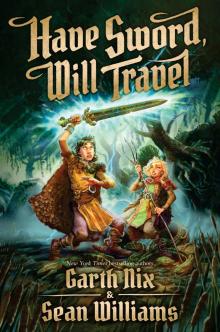 Have Sword, Will Travel
Have Sword, Will Travel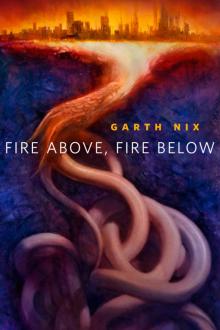 Fire Above, Fire Below
Fire Above, Fire Below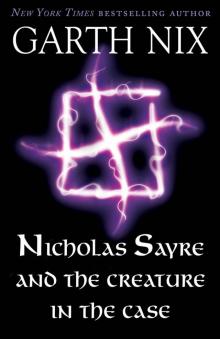 Nicholas Sayre and the Creature in the Case
Nicholas Sayre and the Creature in the Case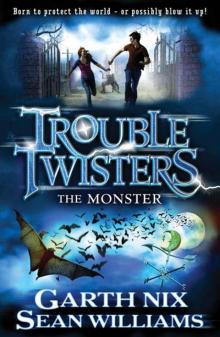 The Monster (Troubletwisters)
The Monster (Troubletwisters)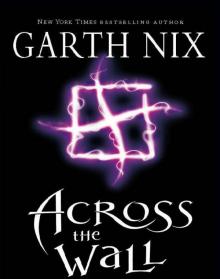 Across the Wall
Across the Wall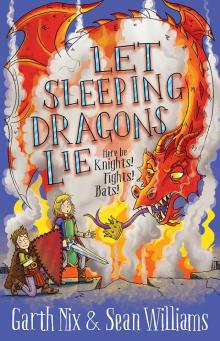 Let Sleeping Dragons Lie
Let Sleeping Dragons Lie![[Abhorsen 03a] - Across the Wall Read online](http://i1.bookreadfree.com/i2/04/12/abhorsen_03a_-_across_the_wall_preview.jpg) [Abhorsen 03a] - Across the Wall
[Abhorsen 03a] - Across the Wall